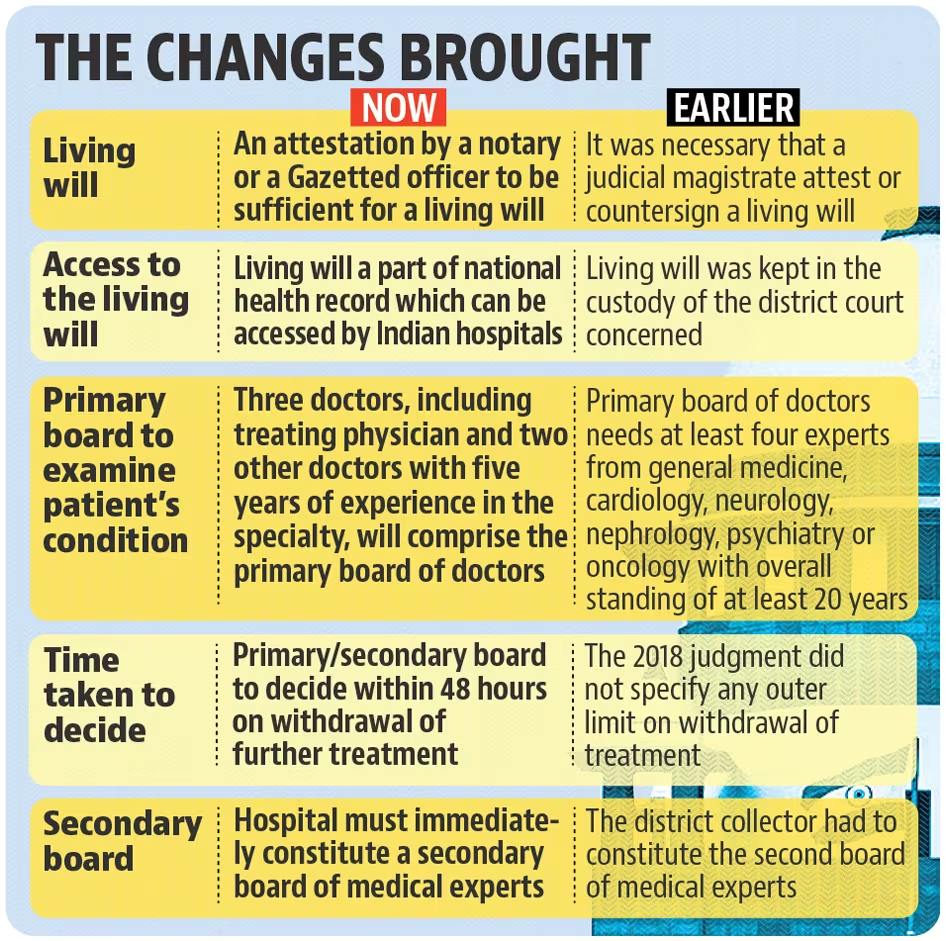Ethics
SC Eases Norms for Passive Euthanasia
- 27 Jan 2023
- 5 min read
For Prelims: Passive euthanasia, National Health Digital Record, Article 21, Living Will.
For Mains: Major Changes in Guidelines of Passive Euthanasia, Euthanasia in India.
Why in News?
The Supreme Court in India has made changes to the rules for passive euthanasia with the primary objective to make the process less difficult and less time-consuming.
What are the Major Changes in Guidelines?
- The Supreme Court tweaked the previous judgement to do away with the necessity of a judicial magistrate to attest or countersign a living will.
- SC held that an attestation by a notary or a gazetted officer would be sufficient for a person to make a valid living will.
- Instead of the living being in the custody of the district court concerned, SC said that the document will be a part of the National Health Digital Record which can be accessed by hospitals and doctors from any part of the country.
- If the hospital’s medical board denies permission to withdraw medical treatment, the family members of the patient can approach the relevant high court, which forms a fresh board of medical experts to enable the court to take a final call.
What is Passive Euthanasia?
- About:
- Passive euthanasia is the act of withholding or withdrawing medical treatment, such as withholding or withdrawing life support, with the intention of allowing a person to die.
- This is in contrast to active euthanasia, which involves an active intervention to end a person’s life with substances or external force, such as administering a lethal injection.
- Passive euthanasia is the act of withholding or withdrawing medical treatment, such as withholding or withdrawing life support, with the intention of allowing a person to die.
- Euthanasia in India:
- In a landmark judgement, the Supreme Court of India legalised passive euthanasia in 2018, stating that it was a matter of ‘living will’.
- According to the judgement, an adult in his conscious mind is permitted to refuse medical treatment or voluntarily decide not to take medical treatment to embrace death in a natural way, under certain conditions.
- It also laid down guidelines for ‘living will’ made by terminally ill patients who beforehand know about their chances of slipping into a permanent vegetative state.
- The court specifically stated that “Dignity in the process of dying is as much a part of the right to life under Article 21. To deprive an individual of dignity towards the end of life is to deprive the individual of a meaningful existence.”
- Different Countries with Euthanasia:
- Netherland, Luxembourg, Belgium allows both euthanasia and assisted suicide for anyone who faces “unbearable suffering” that has no chance of improvement.
- Switzerland bans euthanasia but allows assisted dying in the presence of a doctor or physician.
- Canada had announced that euthanasia and assisted dying would be allowed for mentally ill patients by March 2023; however, the decision has been widely criticised, and the move may be delayed.
- United States has different laws in different states. Euthanasia is allowed in some states like Washington, Oregon, and Montana.
UPSC Civil Services Examination, Previous Year Question (PYQ)
Q. Right to Privacy is protected as an intrinsic part of Right to Life and Personal Liberty. Which of the following in the Constitution of India correctly and appropriately imply the above statement? (2018)
(a) Article 14 and the provisions under the 42nd Amendment to the Constitution.
(b) Article 17 and the Directive Principles of State Policy in Part IV.
(c) Article 21 and the freedoms guaranteed in Part III.
(d) Article 24 and the provisions under the 44th Amendment to the Constitution.
Ans: (c)






-min.jpg)